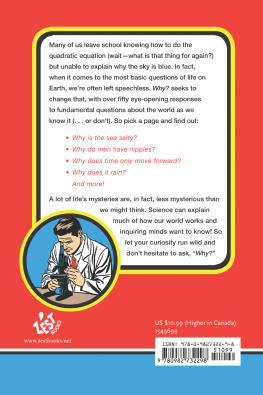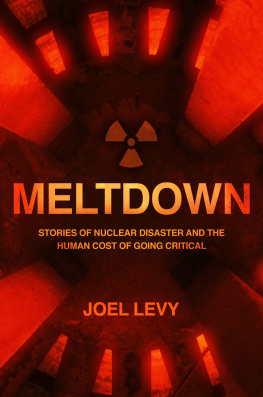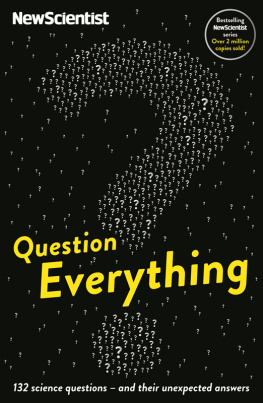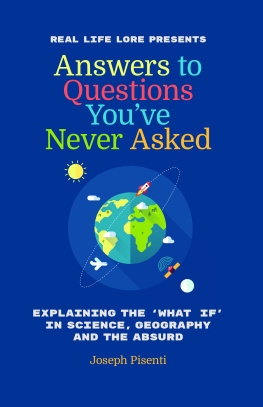All rights reserved. No part of this publication may be reproduced or used in any form or by any meansgraphic, electronic, or mechanical, including photocopying, recording, or information storage and retrieval systemswithout the written permission of the publisher.
Manufactured in the U.S.A.
DOC 10 9 8 7 6 5 4 3 2 1
4500437163
JOEL LEVY is a writer and journalist specializing in science and history. He is the author of more than a dozen books, including Poison: A Social History; Great Scientists, Mad Science; and Scientific Feuds: From Galileo to the Human Genome Project, and has also written features and articles for newspapers and magazines. He lives in London.
Introduction
A generous and elevated mind is distinguished by nothing more certainly than an eminent degree of curiosity. Samuel Johnson
Be not curious in unnecessary matters, the Bible declares, for more things are showed unto thee than men understand. I respectfully disagree, and the fact that youve picked up this book suggests that your generous and elevated mind is also distinguished by a degree of curiosity. Hopefully, the answers in these pageswhich range from knowledge you may have garnered from old school textbooks to unusual but true facts youre more likely to pick up from interesting anecdotes than from the Encyclopedia Brittanicawill reward that curiosity. Did you know, for instance, that you get heavier when you sunbathe but that when water freezes into ice, it gets lighter? Or that no one knows how long lobsters might be able to live? Or that the earth is smoother than a billiard ball? Or that, contrary to popular belief, giraffes are very chatty but talk in tones too low for us to hear?
These and many other bits of triviasuch as the number of volcanoes erupting as you read this line (around 20) to the color of the sky on Mars (red)are revealed in the process of answering over 50 deceptively simple questions about nature.
Obviously, there are an infinite number of questions that could have been asked, so why choose this particular assortment? In selecting the questions, I have tried to cover both classic musings (Why is the sky blue?) and ones that might not have previously occurred to you (Why do we forget?), from geology to psychology, from cosmology to chemistry, with questions ranging from the mundane (Why does my cell phone lose its signal?) to the esoteric (Why does time only move forward?).
I have tried to provide several levels or layers of explanation. Each answer begins with a one-line explanation before giving more detail and, in some instances, challenging the basic premise of the question. (For instance, did you know that there actually is no dark side of the moon?) Then the answer is given in more detail, with a fuller explanation and, where possible, some illuminating and fun trivia.
Keep in mind, when reading the answers, the difference between proximate and ultimate explanations. A proximate explanation describes the immediate, direct cause for something. For instance, ice floats because it is less dense than liquid water. But proximate explanations often invite a further questionfor instance, why is ice less dense than water? This is where the ultimate explanation comes in, that details the root causein this case, the unique ability of water molecules to form a special type of bond with each other, which leads to the unusual properties of ice.
The search for ultimate explanations can steer us in exciting and unexpected directions, and you will see that some of the least promising questions turn out to have the most interesting answers. For example: Why are men generally bigger than women? At first glance, this doesnt appear to be the most profound or interesting question in the book, but the search for an answer leads into strange territory, taking us on a journey through the sexual habits of apes, the logic of genetic inheritance, and the importance of a fathers involvement in raising girls.
Not all of the questions can be answered. Nobody really knows, for instance, why we dream or even the reason for sleep. Explanations for the expansion of the universe are only theoriesinformed speculation on a cosmic scale. The nature and causes of global warming are extremely contentious, and in a book of bite-sized answers, there obviously isnt enough space to do full justice to the range of opinion or evidence involved. Karl Popper pointed out that our knowledge can only be finite, while our ignorance must necessarily be infinite, but I would prefer to leave you with the more consoling words of James Thurber: It is better to ask some of the questions than to know all of the answers.

NATURE
AND THE
EARTH

Why does the sun shine?
The sun shines because it is constantly explodinglike a giant nuclear bomb.
A nuclear bomb explodes because of a process called nuclear fusion, in which the nuclei (the bits in the middle) of atoms are fused together, releasing huge amounts of energy. Some of this energy is in the form of heat and some is in the form of light. The sun is like a massive nuclear bomb exploding at every given moment, so it is constantly expelling both heat and lightso much that it warms and brightens the earth, which is 92 million miles away.
The sun is a huge ball of gas, 2,200 trillion trillion tons of it (thats a mass some 333,000 times heavier than the earth). Most of this gas is hydrogen. The enormous gravity of the sun squeezes this gas so tightly that the nuclei of the hydrogen atoms fuse together to form helium nuclei. In the process, a tiny fraction of the mass of each nucleus is converted into energy, so that the sun is exploding more fiercely than four million nuclear bombs a second!
Burning away
The sun burns through so much fuel that it loses the equivalent of a supertankers cargo every heartbeat. Fortunately, the sun is so immense that this missing chunk of matter makes little difference. Even though it has been burning matter at this rate for billions of years, the sun has only lost 0.1 percent of its mass, and it will be another five billion years before it runs out of hydrogen for fusion.
What exactly happens in the sun during nuclear fusion? The nucleus is the hub in the center of an atom, which is normally surrounded by electrons. The intense heat of the sun strips these electrons off atoms of hydrogen, leaving behind a big soup of hydrogen nuclei. Hydrogen is the smallest and simplest element, and its nucleus consists of single nuclear particles. Under the intense gravity of the sun, four of these nuclear particles are crushed together until they fuse into a new type of atomic nucleusa helium nucleus. During this process, the sun generates energy at about the same rate as 400 trillion power stations working at full capacity!

















